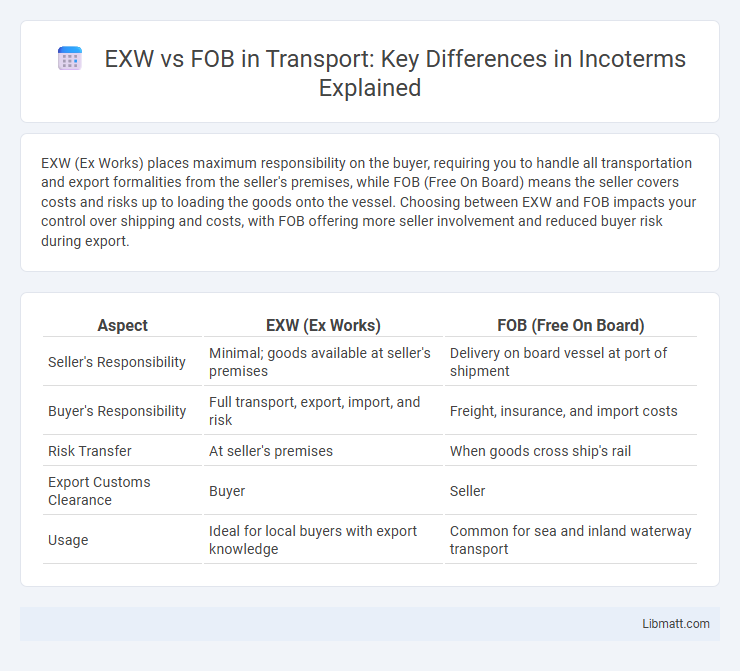EXW (Ex Works) places maximum responsibility on the buyer, requiring you to handle all transportation and export formalities from the seller's premises, while FOB (Free On Board) means the seller covers costs and risks up to loading the goods onto the vessel. Choosing between EXW and FOB impacts your control over shipping and costs, with FOB offering more seller involvement and reduced buyer risk during export.
Table of Comparison
| Aspect | EXW (Ex Works) | FOB (Free On Board) |
|---|---|---|
| Seller's Responsibility | Minimal; goods available at seller's premises | Delivery on board vessel at port of shipment |
| Buyer's Responsibility | Full transport, export, import, and risk | Freight, insurance, and import costs |
| Risk Transfer | At seller's premises | When goods cross ship's rail |
| Export Customs Clearance | Buyer | Seller |
| Usage | Ideal for local buyers with export knowledge | Common for sea and inland waterway transport |
Introduction to Incoterms: EXW and FOB Explained
EXW (Ex Works) and FOB (Free On Board) are key Incoterms defining responsibilities in international trade, with EXW placing minimal obligation on the seller, who merely makes goods available at their premises. FOB shifts more responsibility to the seller, requiring them to deliver goods onto the shipping vessel and clear them for export, impacting cost and risk distribution. Understanding these distinctions helps you optimize shipping logistics and control over your cargo during transit.
Defining EXW (Ex Works): Key Features
EXW (Ex Works) requires the seller to make the goods available at their premises, with minimal responsibility for loading or export clearance. Your primary responsibility as the buyer includes arranging transportation, export documentation, and assuming all risks once the goods are collected. This term emphasizes low seller obligation while maximizing buyer control and costs related to shipment logistics.
Understanding FOB (Free On Board): Essential Points
FOB (Free On Board) means the seller is responsible for delivering goods onto the ship at the named port of shipment, covering all costs and risks until that point. The buyer assumes responsibility once the goods pass the ship's rail, including freight, insurance, and unloading charges. This term is commonly used in maritime shipping to clarify the transfer of risk and cost between seller and buyer.
Main Differences Between EXW and FOB
EXW (Ex Works) places the minimum obligation on the seller, requiring them to make the goods available at their premises, while FOB (Free on Board) obligates the seller to deliver goods onto the ship at the named port of shipment. You are responsible for all transportation costs and risk once the goods leave the seller's premises under EXW, whereas under FOB, the seller bears these until the goods pass the ship's rail. The main difference lies in the transfer point of risk and cost, with FOB offering more seller responsibility and customer protection during export loading.
Buyer and Seller Responsibilities in EXW
Under EXW (Ex Works), the seller's responsibility is limited to making the goods available at their premises, with no obligation to load the goods for export or clear them through customs. The buyer assumes full responsibility for all transportation costs, export and import duties, insurance, and risks from the seller's location onward. This term places minimal responsibility on the seller and maximum responsibility on the buyer for export logistics and freight handling.
Buyer and Seller Responsibilities in FOB
In FOB (Free On Board) terms, the seller is responsible for delivering the goods on board the vessel at the named port of shipment and clearing the goods for export. The buyer assumes responsibility for all costs and risks from that point forward, including freight, insurance, and unloading. Your primary concern as a buyer is to arrange and pay for the main carriage and manage all import formalities once the goods are loaded.
Cost Implications: EXW vs FOB
EXW (Ex Works) places maximum cost responsibility on the buyer, as they bear all expenses from the seller's premises onward, including inland transport, export clearance, and risk during transit. FOB (Free on Board) shifts more cost obligations to the seller, covering export duties, loading costs, and freight to the vessel, reducing your upfront logistical expenses and risk before shipment. Understanding these cost implications enables you to negotiate terms that align with your budget and supply chain strategy.
Risk Transfer and Liability Comparison
Under EXW (Ex Works), the buyer assumes all risk and liability once the goods are made available at the seller's premises, bearing responsibility for loading, export clearance, and transportation costs. In contrast, FOB (Free On Board) transfers risk and liability from the seller to the buyer only when the goods pass the ship's rail at the named port of shipment, with the seller responsible for export clearance and loading. This fundamental difference in risk transfer affects insurance requirements and contractual obligations, making FOB more protective for buyers during the initial transportation stages.
Choosing the Right Incoterm for Your Business
Selecting the right Incoterm between EXW (Ex Works) and FOB (Free on Board) depends on your control preferences and risk tolerance during shipping. EXW places minimal responsibility on the seller, requiring the buyer to handle all transportation and export formalities, while FOB shifts responsibility to the seller until goods pass the ship's rail, offering more seller support and reduced buyer risk. Understanding these distinctions ensures you optimize logistics costs and clearer risk management tailored to your business needs.
Tips for Negotiating EXW and FOB in International Trade
When negotiating EXW and FOB terms in international trade, clearly define your responsibilities for loading and risk transfer to avoid unexpected costs. Ensure your contract specifies who handles customs clearance, with EXW usually placing more burden on the buyer and FOB requiring the seller to manage export duties. You can save time and reduce disputes by agreeing on precise delivery points and including detailed terms on insurance and shipping logistics.
incoterms EXW vs FOB Infographic

 libmatt.com
libmatt.com